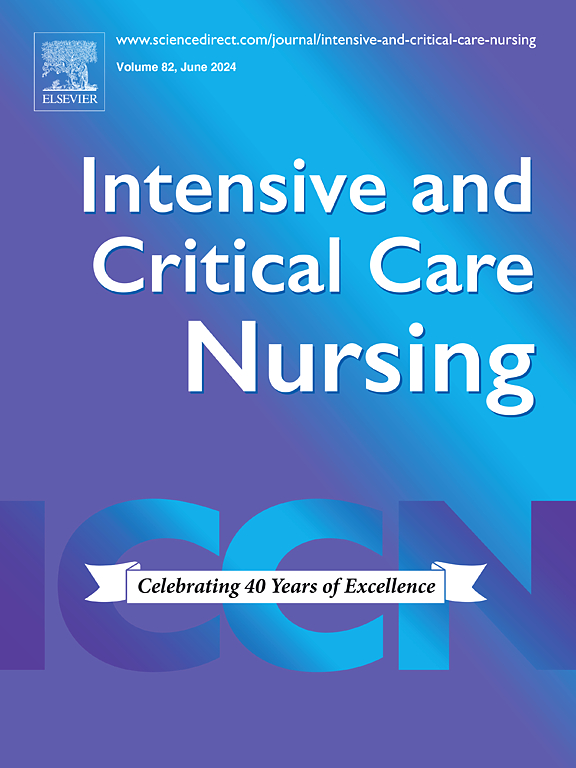Relationship between perceived stress and health literacy on family satisfaction among family members of critically ill patients: A multicenter exploratory study
IF 4.9
2区 医学
Q1 NURSING
引用次数: 0
Abstract
Background
Intensive care unit (ICU) admission is often a stressful experience that can negatively influence family satisfaction (FS) with patient care, communication, and decision-making. Health literacy (HL) is associated with the patient’s ability to obtain, process, and understand health-related information. Few studies have explored the influence of perceived stress and HL on FS simultaneously.
Objective
To examine the association of perceived stress and HL with FS among family members of ICU patients.
Design
A multicenter exploratory cross-sectional study.
Methods
An exploratory, cross-sectional, multicenter study was conducted in three ICUs from different hospitals in Chile. Family members of ICU patients with ≥48 h of stay and respiratory support were eligible. The Family Satisfaction in the Intensive Care Unit-24 questionnaire and the Perceived Stress Scale were used. HL was evaluated using three screening questions. Multiple beta regressions were fit to explore the association between perceived stress, HL, and FS.
Results
A total of 101 family members with 63.4% identified as at risk of low HL were included. Multiple beta regression revealed that low HL was not associated with FS. Conversely, FS was negatively associated with perceived stress, being admitted to the ICU of the central or southern region, and having a close personal relationship with a healthcare provider but positively associated with the number of communications with ICU staff.
Conclusions
While perceived stress can be detrimental to FS, HL seems not to impact FS levels among family members of ICU patients. Further studies are required to explore the influence of HL on FS.
Implications of the clinical practice
This study advances the knowledge regarding variables affecting FS in the ICU. Evaluating the family members’ emotional status may help ICU healthcare providers in the allocation of resources to support family members and to properly assess their satisfaction.
Patient or public contribution
Family members of ICU patients participated in this study.
危重病人家属感知到的压力与健康素养对家庭满意度的关系:一项多中心探索性研究。
背景:重症监护病房(ICU)入住通常是一种压力体验,会对患者护理、沟通和决策的家庭满意度产生负面影响。健康素养(HL)与患者获取、处理和理解健康相关信息的能力有关。很少有研究同时探讨感知应激和HL对FS的影响。目的:探讨ICU患者家属感知应激、HL与FS的关系。设计:多中心探索性横断面研究。方法:对智利不同医院的三家icu进行探索性、横断面、多中心研究。住院时间≥48 h并有呼吸支持的ICU患者家属纳入研究对象。采用重症监护病房家庭满意度问卷-24和感知压力量表。HL通过三个筛选问题进行评估。采用多元beta回归来探讨感知压力、HL和FS之间的关系。结果:共纳入101名家庭成员,其中63.4%确定为低HL风险。多元回归显示,低HL与FS无关。相反,FS与感知压力、入住中部或南部地区ICU以及与医疗保健提供者有密切的个人关系呈负相关,但与与ICU工作人员的沟通次数呈正相关。结论:虽然感知压力可能对FS有害,但HL似乎不会影响ICU患者家属的FS水平。HL对FS的影响有待进一步研究。临床实践意义:本研究提高了对ICU中影响FS的变量的认识。评估家庭成员的情绪状态可以帮助ICU医护人员分配资源来支持家庭成员,并正确评估他们的满意度。患者或公众贡献:ICU患者家属参与本研究。
本文章由计算机程序翻译,如有差异,请以英文原文为准。
求助全文
约1分钟内获得全文
求助全文
来源期刊

Intensive and Critical Care Nursing
NURSING-
CiteScore
6.30
自引率
15.10%
发文量
144
审稿时长
57 days
期刊介绍:
The aims of Intensive and Critical Care Nursing are to promote excellence of care of critically ill patients by specialist nurses and their professional colleagues; to provide an international and interdisciplinary forum for the publication, dissemination and exchange of research findings, experience and ideas; to develop and enhance the knowledge, skills, attitudes and creative thinking essential to good critical care nursing practice. The journal publishes reviews, updates and feature articles in addition to original papers and significant preliminary communications. Articles may deal with any part of practice including relevant clinical, research, educational, psychological and technological aspects.
 求助内容:
求助内容: 应助结果提醒方式:
应助结果提醒方式:


